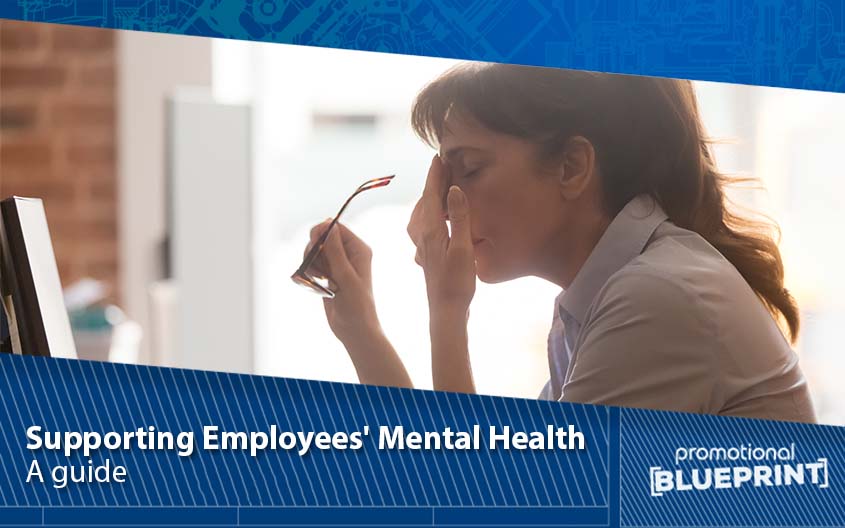
In the past two years, the world as we know it has been forever changed. The Covid-19 pandemic, social unrest, inflation, and widespread armed conflicts continue to plague the entire world.
These circumstances have led to a lot of uncertainty, anxiety, and stress for many people. But despite these feelings and everything happening around them, employees are still expected to go to work every day, be productive, and juggle their personal lives at the same time.
Of course, doing so is often easier said and done. In fact, studies show that employees all around the globe have been struggling to maintain their mental health in the office. They often feel anxious and lost, and both their productivity and interest in their work suffer for it.
In such circumstances, the support of employers and companies in general is more important than ever. It can make a big difference and show employees that they are not alone and that their issues matter.
If you are a business owner looking for advice on how to support your staff’s mental health, read on. Here is a comprehensive guide that can help you understand and assist your employees.
Why Is Employee Mental Health Important?
Anxiety, stress, depression, and other mental health disorders can have a big impact on one’s work life. For one, they can bring down people’s confidence and make them question their role and identity in the workplace.
In addition, poor mental health can directly affect productivity. Namely, employees might struggle with focus, time management, and not feeling capable enough to fulfil their everyday tasks.
It is also important to mention that anxiety and depression also usually lead to insomnia or restless sleep. That can make working productively even more challenging, as people aren’t physically able to do their job due to a lack of sleep and rest. Moreover, exhaustion can lead to a lapse in judgement that usually wouldn’t occur in better circumstances.
If they continue over a long time, the lack of sleep and proper time off can also become chronic. In that case, employees become burnt out, which is a condition that can take years to overcome completely.
From these examples, it is not difficult to see why emphasising employee mental health is important for every company. If your staff is satisfied, confident, and supported, their productivity will reach an all-time high. In turn, your brand will thrive, and your employee retention rates will be excellent.
Why Employers Should Discuss Mental Health Issues With Employees
Although people can seek professional help from mental health counsellors, it is still up to their employers to ensure they feel safe and supported in the workplace. In other words, every employer has to put their staff’s mental health first and encourage open communication and sharing.
With mental health issues still being highly stigmatised, it is more pivotal than ever to remind people that opening up is okay. It is also a good idea to lead by example and share some of your own fears and anxieties. Doing so will show your staff that they are not alone and someone is always there to support them.
When trying to reach out to your employees and engage with them, you should pay special attention to certain factors. For example, class, age, race, and sex often affect how people will respond and deal with their problems. Thus, you should approach each employee individually and offer them the kind of support that suits their needs.
The truth is, a healthy and encouraging workplace atmosphere can actually improve one’s mental health. For that to happen, every employer has to do their part to make their company a safe space for everyone.
How Can You Help Your Employees’ Mental Health?
As already mentioned, every employee will respond differently to your approaches. Thus, it is essential to get to know them as much as you can and to pay attention to their needs and preferences.
In most cases, a combination of several solutions will work best when it comes to addressing mental health struggles. Here are some that you can consider for your own business.
1. Show Vulnerability
First and foremost, you must become a role model. If you are closed off and disregard your own mental health problems and needs, why would your employees do anything differently at their job?
So, try to share more of your own struggles. Comment on your performance, tell your staff about what’s worrying you and encourage them to do the same. After all, seeing someone in a position of power owning up to their problems will surely help many share their thoughts and worries.
In addition, it is also important to take action and not just speak up. For example, you can show your staff that self-care is important by going on a mid-day walk for your mental health or taking more breaks than usual. As long as you can demonstrate that breaking your routine to recharge is okay, you can do anything you think would help.
2. Prioritise Check-Ins
No matter how much you appear available, sometimes they simply won’t be comfortable coming to you with their problems. Thus, you should make it a habit to go to your staff instead and offer them your support.
For instance, it is a wise idea to schedule regular check-ins with each member of your team. You can do this weekly for mid-sized groups so that you don’t overwhelm them but still show them you care.
Make sure to check in on all employees, regardless of whether they work from the office or home. They all need equal support and reassurance.
Although they might seem intimidating, don’t be frightened of these meetings. You don’t have to do much. In fact, most people just need someone to ask if they are okay and offer a willing ear if they need to vent. Be understanding and supportive, and only offer advice if someone explicitly asks for it.
While your staff talks, make sure to really listen. In addition, ask them how you can help and what would make their time at work easier, more manageable, and anxiety-free.
And, most importantly, remember to respect everyone’s boundaries. If someone isn’t willing to share their troubles, don’t push them. Oftentimes, just knowing that they have that option is enough to make people feel cared for and understood.
3. Give Your Employees Care Baskets
As simple as it might seem, it is actually one of the most effective approaches you can try. Thoughtful and well-timed gifts can mean the world to someone who is struggling, regardless of the gift’s value.
If you opt to give your staff some corporate gifts, you should take the time to get to know each employee and their likes. Not all gifts will appeal to every single person, and your success depends on how personal the baskets feel.
For example, a general basket can contain some classic self-care items: branded face masks, heat packs, a nice printed mug, some nice winter snacks, a blanket, etc. You can customise each item with your employees’ initials and supportive or funny messages.
If you wish to take things a step further, you can gift them tickets to a theatre or art gallery exhibit, as well as a concert or other events they are interested in. That way, you can remind them that taking the time to do their hobbies is priceless.
Moreover, you can choose pretty much any gift you think would work in a given situation. Do they like printed stationery? Some personalised keyrings? Or are they more into comfortable sweatshirts or other branded clothing? No matter their preference, you can definitely find a suitable gift that will help them feel better and remind them that you care.
Related content:
A Comprehensive Guide in Choosing the Right Corporate Gifts
4. Encourage Flexibility
For this step, we will once again emphasise the importance of actions over words. You have to ensure that, if your employees need to, they can adjust their schedules according to their mental health.
Allow them to take mental health days or to work from home when things get really tough. In addition, make sure your employees feel safe enough to approach you and arrange alternative plans that will benefit everyone involved.
Most importantly, don’t think that working fewer hours or taking mental health breaks will somehow cost your company. On the contrary, it will improve productivity in the long run, which will benefit your entire business.
5. Prioritise Communication
In many cases, employee mental health suffers due to sudden and unexpected changes in the workplace. Namely, people get anxious and stressed when a lot of work piles up all at once or they aren’t notified of essential information accordingly.
Luckily, it is quite easy to prevent this type of anxiety and stress. All you have to do is prioritise communication on every level of your company. Make sure you keep everyone informed on all changes and updates, and organise progress check-in meetings at least bi-weekly.
Furthermore, make an effort to make schedules and state which tasks have priority at any given point. That way, you can prevent most surprises and ensure your staff always know where they stand.
6. Make Important Resources Available
As already mentioned, you should always strive to destigmatise asking for help and seeking therapy. A great way to do so is to conduct research and make sure that your employees have access to helpful resources at your company.
For example, you can include mental health services in your employees’ healthcare plans. Moreover, you should share relevant websites, hotlines, and treatment centres over and over again, all the while emphasising that asking for help is not only okay but desirable.
The more you normalise asking for help and taking care of one’s mental health in the workplace, the more relaxed people will become. Then, if the time comes, they will know where to ask for help. Even more importantly, they will acknowledge and appreciate your support.
To Sum Up
Since we are living in unprecedented times, it comes as no surprise that many people are struggling to adjust. These struggles often result in anxiety, high stress levels, insomnia, depression, and other mental health issues.
These conditions affect each aspect of one’s life, including the ability to work productively. In fact, it can make people’s self-confidence plummet and their time management skills worsen, resulting in poor performance at work.
Now more than ever, it is important to address mental health issues in the workplace. To that end, managers and other executives have to get involved. They should share their own struggles, emphasise schedule flexibility, and make their employees feel supported.
From offering important resources to giving custom gifts, there are many approaches employers can take to make everyone’s time in the workplace better. Hopefully, this list provides you with the tools and ideas you need to start a healing journey for all your employees.
You may also like:
Why Your Brand Needs Promotional Bottles
Prioritise your employees’ mental well-being with our range of promotional items designed to support their overall health. From stress-relieving products to mindfulness tools, we offer a selection of printed well-being products that promote relaxation, mindfulness, and self-care. Additionally, our personalised kitchenware collection provides practical tools for creating nourishing meals and fostering a positive work-life balance. Invest in your employees’ mental health and create a harmonious work environment with our promotional items, ensuring their well-being and productivity thrive. Choose GoPromotional to show your commitment to their mental well-being through thoughtful and useful products. Contact us at 0800 0148 970 or simply email us today. We are waiting for your call!






